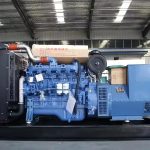Introduction
In today's modern world, the need for reliable and efficient power generation is more critical than ever. Whether it is for backup power during emergencies, remote locations without access to the grid, or as the primary source of electricity in industrial settings, diesel generators have proven to be a dependable and cost-effective solution. One of the key factors that make diesel generators so popular is their fuel efficiency. In this article, we will explore the various aspects of diesel generators that contribute to their fuel efficiency and how users can maximize their performance in this regard.
Understanding Diesel Generators
Before delving into the specifics of fuel efficiency, it is essential to have a basic understanding of how diesel generators work. A diesel generator is a combination of a diesel engine and an electric generator (alternator) that converts diesel fuel into electrical energy. The diesel engine powers the generator by burning diesel fuel in a controlled combustion process, which drives the alternator to produce electricity.
Diesel engines are known for their robustness, durability, and fuel efficiency compared to other types of internal combustion engines. These qualities make them particularly well-suited for power generation applications where reliability and efficiency are paramount. Let's now explore the factors that contribute to the fuel efficiency of diesel generators.
Factors Affecting Fuel Efficiency
1. Engine Design and Technology
The design and technology used in the diesel engine of a generator play a crucial role in determining its fuel efficiency. Modern diesel engines incorporate advanced technologies such as common rail fuel injection, variable geometry turbochargers, and electronic engine control units (ECUs) to optimize fuel combustion and power output. These technologies help in achieving higher efficiency levels by ensuring that the diesel fuel is burned more completely and effectively converted into mechanical energy.
2. Size and Capacity
The size and capacity of a diesel generator also impact its fuel efficiency. Oversized generators that are not appropriately matched to the load requirements tend to operate inefficiently at partial loads, leading to fuel wastage. On the other hand, undersized generators may struggle to meet the load demands efficiently, resulting in higher fuel consumption. Therefore, selecting the right size and capacity of the generator based on the expected load profile is essential for maximizing fuel efficiency.
3. Load Profile
The load profile, which refers to the variation in electrical load over time, has a significant influence on the fuel efficiency of a diesel generator. Generators that operate at a constant load tend to be more fuel-efficient than those subjected to frequent load fluctuations. Additionally, diesel generators running at partial loads consume more fuel per unit of electricity generated compared to those running at full capacity. Therefore, optimizing the load profile and ensuring a balanced distribution of loads can help enhance fuel efficiency.
4. Maintenance and Service
Regular maintenance and timely servicing of a diesel generator are crucial for ensuring optimal fuel efficiency. Dirty air filters, clogged fuel injectors, worn-out components, and improper lubrication can all contribute to decreased efficiency and increased fuel consumption. By following the manufacturer's maintenance schedule, monitoring performance metrics, and addressing any issues promptly, users can maximize the fuel efficiency and longevity of their diesel generators.
Strategies for Maximizing Fuel Efficiency
1. Proper Sizing and Load Management
As mentioned earlier, selecting the right size and capacity of the generator based on the load requirements is fundamental to maximizing fuel efficiency. Conducting a thorough load analysis to understand the expected power demands and fluctuations can help in choosing the most appropriate generator size. Additionally, implementing load management strategies such as load shedding, peak shaving, and optimizing operational schedules can further enhance fuel efficiency by maintaining stable load conditions.
2. Energy Storage and Hybrid Systems
Integrating energy storage systems such as batteries with diesel generators can improve fuel efficiency by allowing excess energy to be stored during periods of low demand and discharged when needed. Hybrid systems that combine diesel generators with renewable energy sources like solar or wind power can also reduce fuel consumption by utilizing clean energy whenever available. These hybrid configurations not only enhance fuel efficiency but also contribute to environmental sustainability.
3. 600kw generator and Efficiency Enhancers

Using high-quality diesel fuel that meets the recommended specifications is essential for ensuring optimal performance and fuel efficiency of the generator. Additionally, fuel additives and efficiency enhancers can be used to improve combustion efficiency, reduce emissions, and extend the lifespan of the engine. Regularly monitoring fuel quality, using fuel stabilizers, and adhering to best practices for fuel storage and handling can all contribute to maximizing fuel efficiency.
4. Advanced Control Systems and Monitoring
Employing advanced control systems and monitoring technologies can help optimize the operation of diesel generators for improved fuel efficiency. Automated load management systems, remote monitoring capabilities, and real-time data analytics enable users to track performance metrics, identify inefficiencies, and make informed decisions to enhance fuel efficiency. Moreover, integrating smart controls, predictive maintenance algorithms, and energy management software can further streamline operations and reduce fuel consumption.
Conclusion
Diesel generators have long been a reliable and efficient source of power generation for a wide range of applications. By understanding the factors that influence fuel efficiency and implementing strategies to maximize performance, users can achieve significant cost savings, reduce environmental impact, and ensure uninterrupted power supply. Proper sizing, load management, maintenance practices, and the integration of advanced technologies are key to enhancing the fuel efficiency of diesel generators. As technology continues to evolve, diesel generators are expected to become even more efficient and sustainable, meeting the growing demand for reliable power solutions in a changing world.
